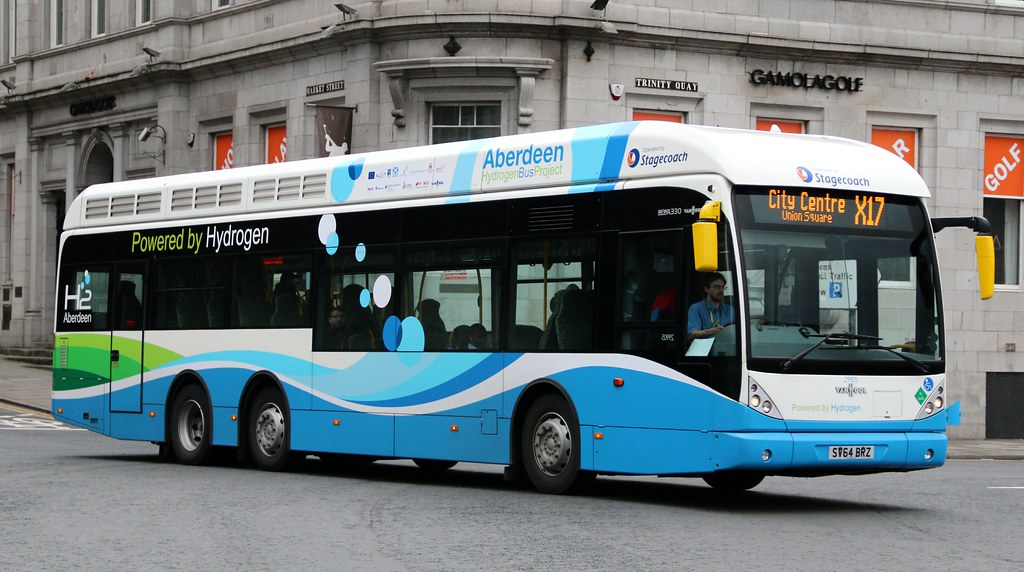
What's it like to ride a hydrogen bus in Aberdeen? Watch this BBC Scotland news report to find out.
Download an information PDF file on the Aberdeen Hydrogen Bus Project
Moderator: Peak Moderation

Little John wrote:Actually, unless the energy used to extract the hydrogen (from water, presumably) is 100% renewable AND it cannot be used directly, then hydrogen, in totality, must have a higher carbon footprint than other forms of energy. I just don't get how people can claim otherwise. Unless I am missing something. Which is of course possible
The Aberdeen Hydrogen Bus project produces hydrogen by electrolysis of water using power from the grid, which is partly powered by wind and solar.emordnilap wrote:There are serious reservations about hydrogen; if it's produced using wind or solar or some such,
So Aberdeen's hydrogen buses use less fossil fuel than buses powered by petrol or diesel engines.emordnilap wrote:it's obviously 'less bad' than other energy sources
Hydrogen tanks have a higher energy to weight ratio than electric batteries.emordnilap wrote:but using that renewable energy more directly rather than producing hydrogen (e.g., directly charging batteries) might make more sense.
Oh, yes, the old phrase 'don't let the perfect be the enemy of the good' applies here. But adam2.Peter Dow wrote:The Aberdeen Hydrogen Bus project produces hydrogen by electrolysis of water using power from the grid, which is partly powered by wind and solar.emordnilap wrote:There are serious reservations about hydrogen; if it's produced using wind or solar or some such,
So Aberdeen's hydrogen buses use less fossil fuel than buses powered by petrol or diesel engines.emordnilap wrote:it's obviously 'less bad' than other energy sources
Hydrogen tanks have a higher energy to weight ratio than electric batteries.emordnilap wrote:but using that renewable energy more directly rather than producing hydrogen (e.g., directly charging batteries) might make more sense.
So hydrogen vehicles (which are also "electric battery" vehicles) make more sense because they can have a longer range than battery-only vehicles.
Grid power does not have to be 100% renewable to have a lower carbon footprint in powering transport than 100% fossil-fuel powered trains or road vehicles.Little John wrote:Actually, unless the energy used to extract the hydrogen (from water, presumably) is 100% renewable AND it cannot be used directly, then hydrogen, in totality, must have a higher carbon footprint than other forms of energy. I just don't get how people can claim otherwise. Unless I am missing something. Which is of course possible
Well where there is no infrastructure of tram lines or overhead power cables - almost everywhere in Britain - then hydrogen buses are cheaper, quicker and can go anywhere.adam2 wrote:It would in most cases make more sense to use the electricity directly to work trams or trolley buses,
And that's exactly what the Aberdeen Hydrogen Bus project does.adam2 wrote:Hydrogen is an inherently problematic fuel to handle and store.
For powering a vehicle, it must either be compressed to a very substantial pressure, which needs an expensive compressor that requires fuel (usually electricity) to run it.
Let's just agree to park that "alternative" in the long grass shall we?Alternatively, the hydrogen may be liquefied by extreme low temperature and then stored at extreme low temperature. The liquefaction also needs costly and energy consuming plant.
"What makes them betteradam2 wrote:I suspect that a modern lithium battery could give a range comparable to a hydrogen powered vehicle, after allowing for the bulk and weight of the special tank, not just the weight of the hydrogen itself.
Fueling a hydrogen vehicle is more complex than simply plugging in an EV or sticking a hose into a liquid fuel vehicle.
Well it is the same electrical grid which powers electric trains and trams and recharges electric vehicles.adam2 wrote:As regards the electricity used to make the hydrogen, it could reasonably be argued that this is 100% fossil fuel derived, mainly from natural gas and a little from coal.
Well sometimes wind turbines have to be constrained or curtailed to produce less power than the maximum possible because there is no demand or the local grid cannot transmit the power to where the demand is.adam2 wrote:Wind, hydro, and solar sources are fully committed, they virtually always produce the maximum possible electricity from the available wind, water,or solar resource.
"FF"?adam2 wrote:The marginal fuel source for electricity generation is always FF, that is any EXTRA electricity demand is met by burning more gas or sometimes coal.